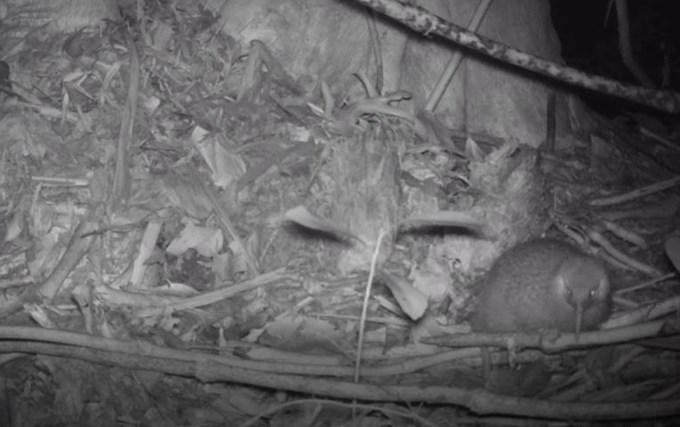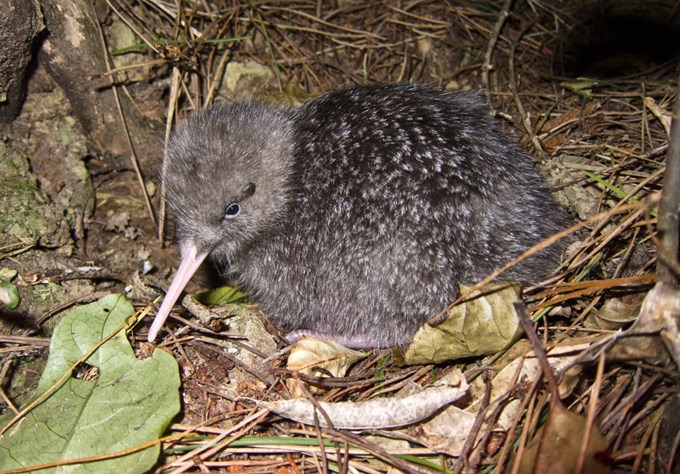Auckland Council’s northern park rangers are celebrating a significant conservation win with the successful hatching of the first surviving little spotted kiwi chick at Shakespear Open Sanctuary.
Albany ward councillors Wayne Walker and John Watson commended the collaborative efforts of the park rangers, Ngāti Manuhiri, and volunteers from the Shakespear Open Sanctuary Society Inc (SOSSI) in attaining the milestone, following the two-stage translocation of 40 single birds from Tiritiri Matangi and Kapiti Islands in April 2017 and March 2018.
“The arrival of the chick makes all the hard work put in by rangers, local iwi, and SOSSI volunteers over the last 18 months worthwhile,” says Cr John Watson.
"It’s a great reward and shows what local communities can achieve when we all work together,” says Cr Wayne Walker.
“This news is just what people have been waiting for. As little spotted kiwi are the smallest and second-rarest of kiwi species, the hatching of this chick is a tremendous feather in our cap in terms of Auckland Council’s ongoing efforts to preserve our rare national bird. Team members have invested hundreds of hours in maintaining the predator-free perimeter, carefully tracking population wellbeing via radio telemetry, and planting 15,000 native trees over winter to enhance the kiwi’s habitat,” says Matt Maitland, Senior Ranger Open Sanctuaries.
Matt says that although translocation is a high-risk, high-return conservation strategy, overall the dividends are paying off.
“The fact that a healthy little spotted kiwi chick has been hatched and is thriving is a good sign that the population is adapting well to their new pest-free home, settling in, and successfully pairing up and breeding.”
Breeding habits of little spotted kiwi
Little spotted kiwi are monogamous and, once paired up, breeding couples will stay together for decades, often mating for life. Following the winter breeding season, the female will lay 1-2 eggs in a clutch, which is then incubated by the male bird only over a period of up to 80 days.
Male birds need to be fit and healthy for the incubation period as they have to deal with over two and a half months of limited feeding. They will only leave the nest to forage for a couple of hours each night. As the egg develops, it is increasingly able to keep itself warm.
Matt says rangers and volunteers first noticed something might be afoot after the transmitter for an adult male showed he was being much less active. As the adult male always incubates the egg, it was hoped this was a good sign that the male was nesting.
Infrared, motion-detector cameras were placed close to the entrance of the burrow. The careful monitoring by rangers and volunteers was rewarded this week when a small chick emerged from the burrow.

Flying solo
Unlike most birds, kiwi chicks are born ‘ready to go’. For the first week, newborn chicks feed off the yolk sac and egg. After a week, they leave the nest, although the adult male will let the chick stay around to pick up on ‘feeding tips’. The chick will be pushed out of the parental territory to fend for itself as soon as a new clutch of eggs arrive.
Pest-free sanctuary sets the stage for success
Maintaining the pest-free status of the Shakespear Open Sanctuary has been one of the secrets to the successful hatching and the ongoing growth of the little spotted kiwi population.
“In the wild, little spotted kiwi chicks have a 5 per cent chance of making it to one year of age. Providing newborn chicks with a predator-free home gives them the best chance of survival.
"So, this lucky chick is off to a great start. The signs so far are very positive that it is thriving,” says Matt.
Although some of the adult birds are fitted with a radio transmitter that enables the team to track and monitor the population, Matt says they will be leaving the new chick to its own devices in line with their efforts to support a self-sustaining little spotted kiwi population.
The ongoing project is made possible thanks to the contributions of Auckland Council, Shakespear Open Sanctuary Society Inc (SOSSI), New Zealand Defence Force, Ngāti Manuhiri, and Watercare Services.


